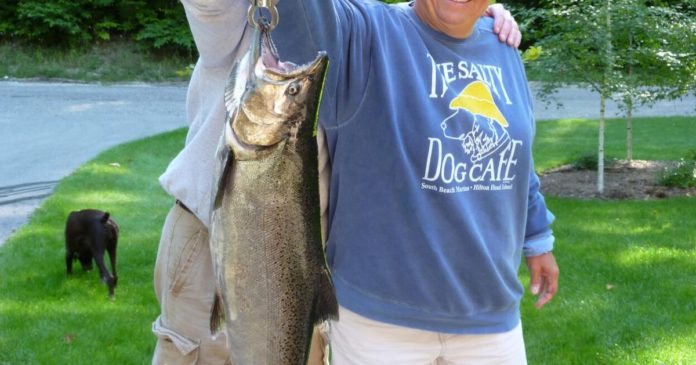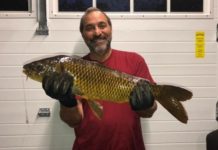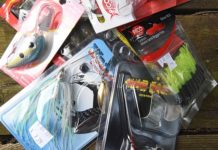Greg Frey
It’s that time of year again. Maybe not the most wonderful time of the year, but not far off. Like last minute Christmas shoppers, boat launches are crowded with predawn anglers anxiously filling out launch permits, running back to the dock, darting among impatient headlights and shoving off into the black unknown. The only thing that’s known for sure is there are chinook salmon gathering off breakwalls and river mouths. Everybody thinks they know where they are and how to catch them, but just like religion and investing, no one knows for sure. The answers will be unveiled along with the winners and the losers within the first two hours after sunup, and sometimes much earlier than that.
I’m one of the contestants, and I think I have some of the answers. After all, I’ve been doing this a long, long time. I’ve even been a fly-fishing guide for over 30 years. But the longer I fish the less I know. Oprah Winfrey wrote a book called “What I know for sure.” I wish, I did, too. My book would have to be something like, “This I think, probably, but not always and there are always exceptions so, let’s just go fishing and see what happens.”
Either way, here we are at the end of August. It’s salmon season, and we all want to catch one (or two or three or four). One last fresh fish meal before autumn arrives and our palates turn to waterfowl and venison. Fun fact, though we have not, the salmon have quit eating. They gorged on alewives all summer long, but now their thoughts have turned to procreation. They hit lures because they are aggressive, not hungry, although they act like my daughter when she’s hangry. Either way, they seem to be in a much fouler mood the hour before and after sunrise and sunset. You may not want to get out of bed at 5 a.m. to catch a salmon, but you stand a much better chance of catching one if you do. This I know. But my dad and I used to catch salmon between 11 a.m. and 2 p.m. on East Bay back in the ‘80s.
Since it’s dark out and the fish are annoyed by lures, they’ll be more annoyed if the lure glows in the dark. Think about how you feel when someone turns the lights on when you’re trying to sleep. Whether they are metal spoons or body baits like J Plugs, glow-in-the-dark lures seem to have a big edge over those that don’t. This I know. But I’ve caught the majority of my fish on a blue and silver jointed Rapala, a natural-looking pearl and brown J-plug that washed up on the beach a long, long time ago, and a white Spin Doctor with a blue and green rubber fly or a chartreuse peanut behind it, none of which glow in the dark.
Salmon seem to move in schools that are often suspended off the bottom. In mid-August you might find them 60-90 feet down when fishing over 115-125 feet of water. The closer you get to Labor Day, the closer they come to shore, and it’s not unusual to catch them in 30 feet of water. This I know. However, for the past three years, I’ve caught most of my salmon in Little Traverse Bay on downriggers set at 115 feet, so close to the bottom that I often hit it.
Salmon are supposedly spooked by boats, so many charter captains and serious salmon anglers run big water planer boards (which are essentially like kites that use water to track away from the boat rather than wind) with lead-core line. They catch more fish than me with my two downriggers and single dipsy diver rod. They also yell at me when I get sandwiched between their boats and have nowhere to turn but toward their lines. I don’t like fishing in crowds with competitive salmon anglers with big rigs. This I know.
I also know an accomplished angler named Ron Furgeson who never uses a downrigger or a planer board or a dipsy diver to catch salmon. He casts ¾-oz. glow-in-the dark Little Cleos in 12-20 feet of water when the salmon move into the shallows off Charlevoix’s Medusa Cement Plant. Ron uses a 17-foot boat and simply drifts and casts. He doesn’t spook fish because his motor is not running. He also catches more fish than me, and he’s kind and quiet. Ron has good fish karma. This I believe strongly, but I’m not sure. Maybe he squirts hangry salmon smell on his lures when I’m not looking.
You don’t need a big boat or fancy equipment to catch salmon. Scott Fisher of Kilwins used to row a little aluminum rowboat out into the Petoskey marina just past the no-wake buoys and well inside of the breakwall. He too would use flash bulbs to charge his glow-in-the-dark spoons that he would cast from his little boat. I would meet him coming off the water at 7:30 a.m. as I was going on the water. Scott used to catch way more salmon than I did. But now Scott has three young children while mine are going off to college this salmon season. I’ll probably catch more fish than him now. This I believe, but I’m not sure.
So, as we enter the peak of the salmon season, I’ve got a lot of ideas and a lot of unanswered questions. I’ll definitely need to spend more time on the water to figure them all out. This I know for sure.
With 27 years experience teaching all subjects to fourth and sixth grade students, Greg Frey is a jack of all trades and a master of none. With 52 years experience wandering around in the outdoors, his hunting and fishing skills follow a similar path.
Credit: Source link






























